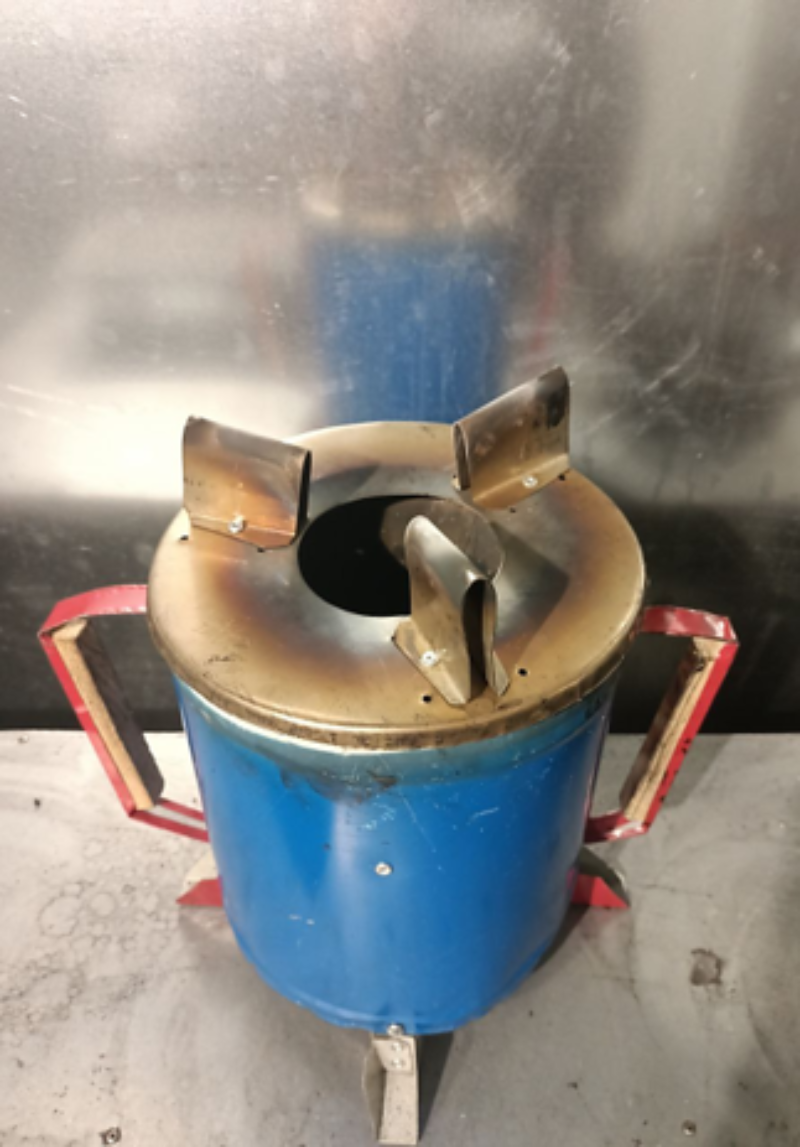Institutional Stove Update
In mid-2023, Burn Design Lab began collaborating on an institutional stove project in Sierra Leone with Westwind Energy (WWE), renowned for their Wonder Stoves brand. This partnership aimed to wholly improve the design and manufacturability of their institutional stove, setting a shift in traditional institutional cooking practices.
WWE has long advanced the cause of energy efficient cooking, job creation, forest preservation, and indoor air quality improvement. This project is not only a commitment to technological advancement but also a dedication to socio-environmental well-being.
Institutional stoves, designed for large-scale cooking, particularly in schools, are the focal point of the project, emphasizing efficiency, durability, and affordability by cutting production costs. Key project goals include reducing biomass fuel use by 40% and establishing a manufacturing system capable of producing 300 stoves per month.
With 99% of Sierra Leone’s population relying on biomass for cooking, the project has the potential to expand to other African countries facing similar reliance on biomass for meal preparation. Introducing clean energy cookstoves in schools not only benefits the environment but also influences children’s perceptions and behaviors, potentially leading to positive impacts on households as well.
Accomplishments to date include identifying design changes to enhance manufacturing processes, implementing cost-effective modifications for immediate productivity and cost reductions, conducting baseline performance testing, and designing the first iteration of the improved stove for reduced fuel use. Continuous feedback collection from current users, particularly women, will guide future innovation measures to improve the stove performance and durability.
Fabrication and assembly has begun on the first prototype stove encompassing the design changes to improve performance. This will be followed by performance testing to validate the new design. Once the validation process has been completed, the project team will work handson in the WWE plant in Sierra Leone to assist the manufacturing team in implementing the new BDL design into the WWE manufacturing process. As production ramps up, the new stove will quickly be available to the field for user feedback to guide further product development.

IMA World Health's Gasifier Stove Project in the DRC
The Democratic Republic of Congo (DRC) faces some of the highest rates of deforestation, driven primarily by the demand for charcoal, which fuels both household cooking and small-scale commercial activities. Slash and burn agriculture further exacerbates this crisis, leaving behind scorched earth and diminishing forest cover. The consequences are dire, not only for the environment but also for the health and livelihoods of the Congolese people.
IMA World Health, an international non-profit organization is partnering with BDL to develop and improve their design of the Top Lit Up Draft (TLUD) Sala Makala stove (which translates to “charcoal maker” in the local language).
This is a clean burning gasifier stove designed to address health, environment, and socio-economic challenges. One out of every 72 persons in the DRC die of illness due to excessive exposure to smoke. BDL’s research and development on the TLUD stove is focused on evaluating design features and improving thermal efficiency and combustion while reducing emissions related to the World Health Organization’s (WHO) Voluntary Performance Requirements. Improving the efficiency of the stove translates to reduced amounts of wood needed for cooking family meals. Along with improving the performance of the stove, BDL is working with IMA to improve their manufacturing system to increase production efficiency and capacity within their factory.
One of the standout features of the TLUD stove is its ability to produce charcoal as a byproduct of cooking, which can serve as fuel for a charcoal stove or sold for additional income. This charcoal, sometimes known as biochar, can also be used to enrich soil.
Civil unrest and the Covid-19 pandemic interrupted IMA’s production and promotion efforts, however, IMA remains committed to see widespread adoption of the stove. The anticipated impact of the TLUD stove is profound. Not only would it significantly reduce wood use contributing to deforestation, and greenhouse gas emissions, but it would also empower communities economically.
Partnering with organizations like IMA World Health funded through the Osprey Foundation, BDL is proving that sustainability solutions are within reach.

USAID MSR Grants Funding to Improved Shea Roaster Project
BDL’s Improved Shea Roaster was awarded a grant from USAID’s Market Systems and Resiliency (MSR) activity in Ghana. This initiative is focused on bolstering Ghana’s agricultural sector, including the shea value chain, ensuring food security and supporting smallholder farmers by connecting them with markets, resources, and services.
Through this grant, BDL has continued the shea roaster technology transfer work through the second half of 2023 and through 2024, with a target of manufacturing and implementing hundreds of roasters by the end of the grant period. This effort will increase manufacturing jobs, improve shea butter production efficiency, boost investment in local shea butter cooperatives, and enhance working conditions, especially for women and youth.


BDL has partnered with SAYeTECH, a local agricultural processing equipment manufacturer in Ghana, building and expanding on their manufacturing capabilities. They are working together to expand the production of BDL’s Improved Shea Roaster design, aiming to create jobs for young people while encouraging their involvement in manufacturing and agricultural markets.